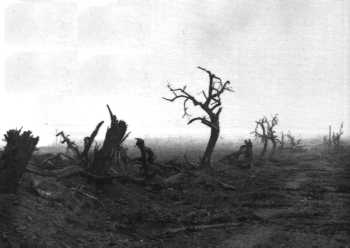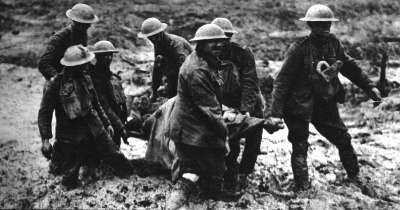Wilfred Owen
(1893-1918)
poet, patriot, soldier, pacifist

"My subject is War, and the pity of War. The Poetry is in the pity."
Wilfred Owen

"The old Lie: Dulce et decorum est
Pro patria mori."
World War I began with great fanfare with long columns of smiling soldiers parading off to war wearing dress uniforms with flowers sticking out of the muzzles of their rifles. Everyone expected it to be over quickly and the heroes returned soon with shiny new metals pinned to their chests. Unfortunately, it did not turn out this way. The war lasted year after year and millions and millions of combatants and non-combatants died. Men lived in rat-infested subterranean holes along muddy and trenches that stretched for miles and fought vicious battles that had little glory and much senseless death. Soldiers thought the war might never end and that their children would grow up to take their place in the carnage of the wreaking trenches. WWI marked the first use of chemical weapons, mass bombardments from the sky on civilian targets, the first genocide. WWI was the true beginning of this our 20th century of spectacular crimes.
But the war did produce some outstanding poets - none of them, in my opinion, any better than Wilfred Owen. A serious child with a literary religious upbringing, Owen was a shy, intense, and scholarly boy who read constantly and endured a domineering pious mother who urged him to become an Anglican priest. However, Owen did not go into religious life and instead left for Bordeaux, France, where he was teaching English in the Berlitz School when the war erupted. He subsequently visited hospitals and became acquainted with many of the war's wounded. Deeply affected by these visits, the 22 year-old young Owen returned to England and enlisted in the British Army. Owen described his decision in September, 1915: "I came out in order to help these boys--directly by leading them as well as an officer can; indirectly, by watching their sufferings that I may speak of them as well as a leader can. I have done the first." He joined the Artists' Rifles - he was surprised to find no artists in the unit - and after training in London was commissioned in June 1916 as a second lieutenant in the Manchester Regiment where he is described as being a competent and sympathetic leader to his soldiers.
In the middle of January 1917, Owen was transferred to the hell of the trenches in France where his outlook on life changed permanently. In late April, Owen found himself stranded in a badly shelled forward position for days looking at the scattered pieces of a fellow officer's body (2/Lt. Gaukroger). He was diagnosed with "neurasthenia" and evacuated from the front to Craiglockhart War Hospital near Edinburgh where he wrote most of his great poetry while convalescing. Owens was bitterly enraged at the senseless killing of the battlefields and the inability of anyone (especially the church) to stop it. He felt enormous pity for his fellow soldiers who suffered, fought, and died in the mud and misery of the trenches. He was horrified at what his sharp poet's eye saw at the front. Owen started the war a cheerful and optimistic man but during the two years of war he was changed forever. This is all immortalized in his famous poetry.
Selections of Wilfred Owen's Poetry

In August 1918, after his friend, the other great War Poet, Siegfried Sassoon, had been severely injured and sent back to England, Owen returned to France where he longed to return to the front although he seemed to know he would be killed there. War was still as horrid as before, but during an attack during the first days of October 1918 he won the Military Cross. Owen was finally machine-gunned to death at the Sambre Canal near Ors in one of the last attacks on the German lines of the war on November 4, 1918 - exactly seven days before the signing of the Armistice. Owen, one of approximately 9,000,000 million fatalities in World War I, was twenty-five years old when he was killed.
The bells had been ringing for one hour on November 11, 1918, in Shrewsbury, England, to celebrate the Armistice when the doorbell rang at Tom and Susan Owen's home, announcing the arrival of the telegram informing them their son was dead.
Only a couple of days before the end of the war, Owen wrote this letter after he and his fellow soldiers took refuge from German shelling in the cellar of a destroyed house. They were all in high-spirits due to the speculation that the war would soon be over and the belief they might survive it. Owens was killed not long after finishing the letter. 
LAST LETTER HOME
"Dearest Mother,Wilfred Owen and his poetry holds such special importance for me because I underwent similar experiences - although not nearly to the same extent, fortunately! When I was also in my 20s figuring out my place in the world and learning some hard metaphysical life lessons, I took a job with the University of California Police Department doing security in the hospital emergency room. Barely twenty-two years old at the time, I was not unlike Owen in being a bookish and somewhat serious type who ended up being greatly affected by watching men die violently. I still remember like it was yesterday looking deeply into the unseeing eyes of a fresh murder victim and wondering at the sadness of the world in the blank expression on his face and the coppery smell of blood emanating from his body bag. It seemed for a time I lived surrounded by violence, and I held it near to my heart. I tried hard to understand it, and never really was sure if I did. It was a dark period in my life, even if I searched and learned the whole time as I tried to make sense of it all.So thick is the smoke in this cellar that I can hardly see by a candle 12 inches away. And so thick are the inmates that I can hardly write for pokes, nudges, and jolts. On my left, the company commander snores on a bench. It is a great life. I am more oblivious than the less, dear mother, of the ghastly glimmering of the guns outside and the hollow crashing of the shells.
I hope you are as warm as I am, soothed in your room as I am here. I am certain you could not be visited by a band of friends half so fine as surround us here. There is no danger down here - or if any, it will be well over before you read these line..."
Subsequently, I decided to try to go into law enforcement where I was also greatly disillusioned by man's inhumanity to man and the general unthinking brutishness of it all. After that I worked for two and a half years as an inner-city school teacher in the most violent area I could find where people killed each other routinely over a mistaken look or petty territorial rivalry; I could not believe nobody would stop the killing and did not understand how so many people could throw away their lives for nothing. I spent hours and hours racking my brains thinking about the problems and possible remedies, but nothing worked and I began to see that not all problems had answers; I began to realize that the good did not always prevail over the evil. Those very influential years in my nascent adulthood in many ways profoundly shaped the man I eventually became.
It is for these reasons that the somber and intense poetry of Owen speaks so directly to me. I can relate entirely to Owen when he talks about death and dying in such intimate terms ("Let us sleep now..."). Fortunately, unlike Owen I was able to survive my 20s and see other more positive aspects of life.
Let all men - especially young men! - who burn with the desire for martial glory and heroism look deeply into the poetry of Wilfred Owen!
My friend, you would not tell with such high zest
To children ardent for some desperate glory,
The old Lie: Dulce et decorum est
Pro patria mori.** The quote is from the famous ode by Horace claiming, "Sweet and fitting it is to die for one's country."
![]()